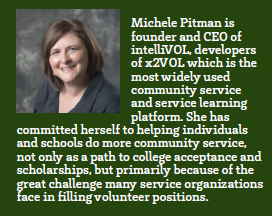
By Michele Pitman
In every extraordinary time, there have been challenges that make us wonder if we should try to carry on in a normal way, or if the change foisted upon us is a chance to reestablish priorities. We’re in that moment and student community service is one of those priorities.
Without truly understanding an important element of service-which is the intentional documentation of a student’s transformation through personal reflections -student volunteering and service work seems an easy “let’s skip that” exercise. It would be easy to walk away from it in difficult times like these, but to do so would not only diminish personal growth opportunities for students and leave gaping holes in college applications and job experiences. It also stresses an already taxed system of community service organizations. Here’s why.
Students Need to Make a Difference
Either pre- or post-pandemic, students always need to find ways to make a difference in other people’s lives, to “go the distance” in order to make things happen. Service programs let students feel that sense of urgency and experience the emotion, the ideas and energies expended while helping another organization or individual. Employers today say that emotional intelligence is one of their most sought after, yet most difficult to measure attributes in candidates. Through service that is documented, verified and reflected upon, students build those capabilities.
Students Need Healing
Students have been essentially alone for a year now, or more. Social activities have been online and far from normal, and hybrid schooling hasn’t made things easier. Service programs were great before COVID, but as we get to the other side of it, they have become even more valuable. There is no better way for students to mend the strain and emotional fatigue of living in a COVID world than to actively get involved helping others. The need to help is innate and service to others is a tremendous COVID relief antidote. Guidance leaders know it. Boards of education will support student service work as the asset to the community it has become, and also as part of the healing process for healthy student growth.
Students Need to Learn Resilience
The usual places where students volunteer have been off limits or restricted during the pandemic. We discovered interesting shifts in what kind of service has been allowed in the past 18 months. Hospitals, convalescent homes, and local businesses weren’t available, so volunteering shifted to home. Students received credit for helping out in their family, for babysitting and tutoring younger siblings, for taking care of elderly family members, for being the home network tech support, for cooking meals, or for delivering groceries to neighbors who couldn’t leave the houses. In many ways, volunteering came closer to home this past year. It became a family and community survival skill and I think we are better for it. Chipping in to help someone you care about is powerful.
Students Need to Reflect
I, of course, am a champion for our system in helping schools organize, direct, and track student service activities. However, the most compelling and necessary component of community service, beyond validating that the service occurred, is the student’s reflections on the engagement. Reflections can be required, written down, and documented for a student’s service record. Through frequent reflection, students discover and share the meaning of their service work in a personal way, they connect to the work and internalize the significance of their experience. It’s not just a requirement or job to be done, but rather part of life’s journey. The importance of reflection is well beyond what is required for a service program, but I have been told many times that students find it unexpected, valuable, even “significant.” Reflections deepen the involvement, and they add to the productive and responsible citizen they will ultimately become.
 I’m thrilled to see students coming back to classrooms, going to football games and getting involved in clubs. But perhaps I am more excited to see local organizations opening back up to volunteers, and schools allowing students to tutor in person to help their peers. And, while the struggles have been great, I believe our society has stepped into a new realm of empathetic enlightenment. Making sure our students stop to reflect on how they helped others is the gift we cannot lose and we’ll continue to give our schools the tools they need to make this happen.
I’m thrilled to see students coming back to classrooms, going to football games and getting involved in clubs. But perhaps I am more excited to see local organizations opening back up to volunteers, and schools allowing students to tutor in person to help their peers. And, while the struggles have been great, I believe our society has stepped into a new realm of empathetic enlightenment. Making sure our students stop to reflect on how they helped others is the gift we cannot lose and we’ll continue to give our schools the tools they need to make this happen.
